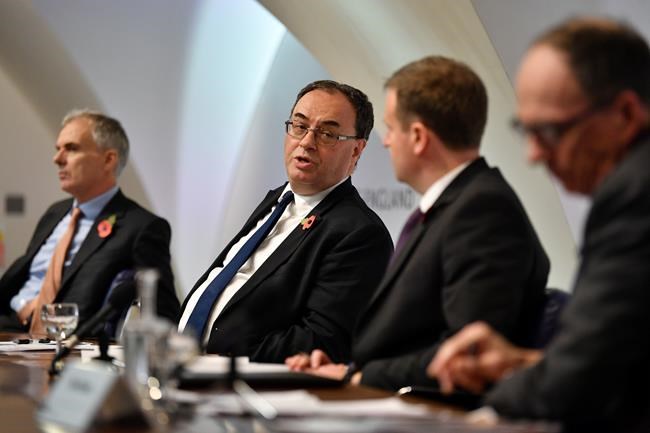Bank of England raises rates as Ukraine war boosts inflation
Advertisement
Read this article for free:
or
Already have an account? Log in here »
To continue reading, please subscribe:
Monthly Digital Subscription
$19 $0 for the first 4 weeks*
- Enjoy unlimited reading on winnipegfreepress.com
- Read the E-Edition, our digital replica newspaper
- Access News Break, our award-winning app
- Play interactive puzzles
*No charge for four weeks then billed as $19 plus GST every four weeks. Offer only available to new and qualified returning subscribers. Cancel any time.
Read unlimited articles for free today:
or
Already have an account? Log in here »
Hey there, time traveller!
This article was published 16/03/2022 (1020 days ago), so information in it may no longer be current.
LONDON (AP) — The Bank of England raised its key interest rate Thursday for the third time since December as it pushes ahead faster than other central banks in combating a global wave of inflation that is set to accelerate following Russia’s invasion of Ukraine.
The bank boosted its key rate to 0.75% after the war pushed oil prices to a 13-year high earlier this month. It comes a day after the U.S. Federal Reserve raised its benchmark short-term rate to 0.25% to tame the worst inflation since the early 1980s.
The Bank of England, which voted 8-1 in favor of the increase, said the invasion of Ukraine has sparked “large increases” in prices for energy and other commodities and is likely to worsen supply chain problems that have disrupted shipments of many raw materials. The bank said it now expects inflation to last longer and peak at a higher rate than it did before the war.

“Global inflationary pressures will strengthen considerably further over coming months, while growth in economies that are net energy importers, including the United Kingdom, is likely to slow,” the bank said in a statement.
The Bank of England began raising rates in December amid concern about rising consumer prices as the world began to emerge from the coronavirus pandemic, increasing demand for energy and raw materials needed by industry.
Consumer price inflation accelerated to an annual 5.5% in January, according to the Office for National Statistics.
Before Russia’s invasion of Ukraine, the Bank of England expected inflation to peak at around 7.25% in April, more than three times its target of 2%. The bank said Thursday that it now expects inflation to accelerate to about 8% by the end of June and that it could rise further later this year.
Central banks in other countries may soon catch up to the Bank of England on interest rate hikes. The Federal Reserve signaled that it may raise rates six more times this year.
However, Turkey’s central bank kept rates unchanged Thursday despite inflation soaring above 54%. European Central Bank also hasn’t touched rates but last week announced an early exit from its economic stimulus efforts in a bid to combat record inflation in the 19 countries that use the euro.


